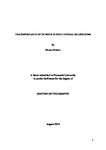THE IMPORTANCE OF HUMOUR IN EDUCATIONAL STAFFROOMS
| dc.contributor.supervisor | Hohmann, Ulrike | |
| dc.contributor.author | Maria, Kmita | |
| dc.contributor.other | Plymouth Institute of Education | en_US |
| dc.date.accessioned | 2016-01-08T13:44:11Z | |
| dc.date.available | 2016-01-08T13:44:11Z | |
| dc.date.issued | 2015 | |
| dc.identifier | 10049272 | en_US |
| dc.identifier.uri | http://hdl.handle.net/10026.1/4187 | |
| dc.description.abstract |
ABSTRACT Staffroom humour constitutes an integral part of teachers’ workplace culture and contributes to the quality of workplace relationships, yet it remains under-researched in the field of educational research. This thesis explores the importance of humour in relationships between teachers and its meaning for the overall workplace culture. This research has two foci; one intended and one acquired. Originally this research was set up to investigate staffroom humour in three educational settings. However, humour between participants and I became another focus of the research. Therefore, apart from exploring how staff use humour in the staffroom and what influences staffroom humour, this research also explores how and why humour was used in interactions between participants and myself. Research was undertaken in three post-16 educational settings in England. This takes the form of a case study and uses a mixture of qualitative methods: group and individual semi-structured interviews, unstructured participant observations and the collection of funny artefacts. Findings show that humour at each workplace is distinctive and makes a unique contribution to workplace culture. Workplace humour is spatially and temporally conditioned. Space and time are crucial conditions determining the use of humour, more important than work politics. Different humour functions are located within workplace relationships and not outside of them. Workplace humour serves to construct, nurture or contest relationships. Contesting and the constructing/nurturing of relationships do not need to be mutually exclusive. Degrees of familiarity between staff, just like type of humour, serve as indicators of the type of work relationship. Familiarity is crucial in deciding who uses humour and how within the workplace. Humour used between participants and researcher reveals a number of expectations and complexities that humour research entails. It also shows how interconnected participants’ and researcher’s behaviours are. What needs to be recognised is the value and role of humour in both relationships between teachers and the participant–researcher relationship. Humour research represents specific challenges and opportunities for rapport, data collection and access negotiation that should be explored further. | en_US |
| dc.description.sponsorship | n/a | en_US |
| dc.language.iso | en | en_US |
| dc.publisher | Plymouth University | en_US |
| dc.subject | Humour, staffroom | en_US |
| dc.subject | Teacher | |
| dc.subject | Workplace culture | |
| dc.subject | Educational research | |
| dc.title | THE IMPORTANCE OF HUMOUR IN EDUCATIONAL STAFFROOMS | en_US |
| dc.type | Thesis | |
| plymouth.version | Full version | en_US |
| dc.identifier.doi | http://dx.doi.org/10.24382/1424 | |
| dc.identifier.doi | http://dx.doi.org/10.24382/1424 |
Files in this item
This item appears in the following Collection(s)
-
01 Research Theses Main Collection
Research Theses Main


